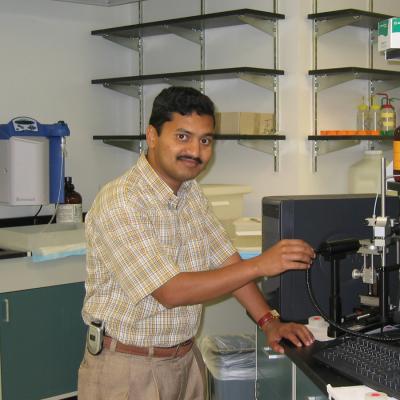A research team led by Swadeshmukul Santra, an Associate Professor at the University of Central Florida, has developed an electronic quantum dots probe that paves the way for testing the efficiency of new pharmaceuticals rapidly.
 Dr. Swadeshmukul Santra (Credit: UCF)
Dr. Swadeshmukul Santra (Credit: UCF)
The electronic quantum dots probe emits light when a drug delivered by it bonds with cancer cells. Using a microscope, scientists can now discover the location and quantity of the delivered drug, as the probe releases a reddish color under MRI or special lighting thanks to its magnetic and optical components.
Several images can be captured without losing the MRI or optical signal until the continuation of the drug test. Scientists can then analyze the pictures to measure the tumor size and count of the tumor cells that ‘light up’ against the original tumor, paving the way for understanding the functionality and efficiency of drugs in the targeted areas rapidly and easily when compared to the existing process of confiscating treated tumors and measuring their weight at regular intervals in animals.
Santra’s team utilized semiconductor quantum dots to fabricate the probe. Quantum dots demonstrate special electronic and optical properties during their agitation thanks to their crystal-look structure and compact size, making them suitable for dependable and sustained imaging with special lights. The team utilized a core made of superparamagnetic iron oxide nanoparticles that is ornamented with satellite CdS:Mn/ZnS quantum dots carrying the STAT3 inhibitor, a cancer-killing agent. The bonding of the probe with the cancer cells turns on the optical signal of the quantum dots.
Santra stated that the novel technique’s immediate potential applications are drug testing, especially cancer research. The team is now testing the technique in live cells, he added. The Director of the NanoScience Technology Center of the University of Central Florida, Sudiptal Seal commented that this novel diagnostic tool will definitely rock the nanomedicine field.